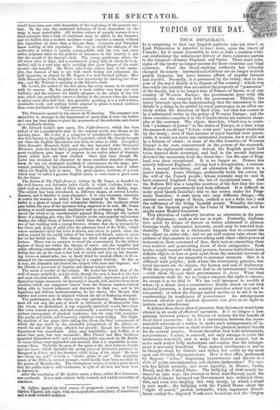The Princess's opened for the season on Wednesday. The company
now assembled is stronger in the department of opera than it ever was before; and care has been taken to place the accessories of the orchestra and chorus on a creditable footing. Mr. Edward Loder's new opera, The Night-Dancers, which has been talked of for a considerable time in the musical world, was chosen as the opening piece. Mr. Loder is a composer of considerable reputation. He was first known to the public by his Nourjahad; which Mr.Arnold brought out when the English Operahouse rose from its ashes in 1834. Nourjahad, John Barnett's Mountain Sylph, and the late lamented John Thomson's Hermann, were the first three operas produced at that theatre; and their great excellence gave hopes of progress in our native school of dramatic music which have not been realized. Since that time, though Mr. Loder has sustained his character by many excellent chamber composi- tions, he has not attempted anything of consequence for the stage; pre- sented, probably, by the inundation of foreign productions, and of others which are English only in name. The great success, however, of a work which may be called a genuine English opera, is once more a good omen for the future.
The drama of The Night-Dancers written by Mr. Soane, is founded on the well-known and favourite ballet Ciselle, in which Carlotta Grisi ex- cited such an interest, first at Paris and afterwards on our Italian stage. The subject has been introduced, in different shapes, at several London theatres, and is familiar to most playgoers: it is only necessary, therefore, to notice the manner in which it has been treated by Mr. Soane. The ballet is a piece of actual and substantial diablerie; the incidents which pass before the eyes of the spectator being supposed to be real. Mr. Soane, wishing to avoid supernatural machinery and an unhappy ending, has re- duced the whole to an unsubstantial pageant flitting through the excited fancy of a sleeping girl, who, like Victorino in the once-popular melodrama, dreams the whole tissue of horrors which form the piece. Giselle, on the eve of her wedding with a young forester, dreams that she is betrayed by her lover, and, dying of grief, joins the phantom band of the Wilis; within whose enchanted circle her lover is drawn, and about to perish, when she wakes, roused by the joyful voices of her lover and friends, come to salute her on her bridal morn. This change we think both gratuitous and in- jurious. There was no occasion to avoid the supernatural, for the wildest regions of fancy are within the domain of opera; and the beautiful and really affecting catastrophe of the ballet—the phantom form of the maiden fading into air, as she casts a last look of sorrow and pity on her despair- ing lover—a catastrophe, too, so finely fitted for musical effect—is ill ex- changed for the commonplace rejoicing of a nuptial festivity. Be this as it may, the dramatist has treated the subject with taste and elegance; and the libretto is possessed of singular and almost unique merit.
The music is worthy of the subject. Mr. Loder has drunk deep of the well of music undefiled; and his style, though his own, is based on the best and most classical models. His melody is graceful, expressive, and undis- figured by vulgar ornament; his harmony is smooth, rich, and free from those crudities which our composers borrow from the German masters without being able to borrow judgment and discretion in their use•' and in his ingenious and delicate instrumentation, he has shown, like Mozart, that variety and power may be attained without the aid of deafening clangour.
The performance, on the whole, was very satisfactory. Madame Alber- tazzi did not sing the part of Gizelle so brilliantly as Mademoiselle Nan (for whom, we understand, it was originally intended) would have done. Her voice wanted power, and had occasionally a tendency to flatness, the evident consequence of physical weakness; but she sang with musician- like purity and finish, and frequently exhibited much feeling. The fright- ful accident of her gauze dress taking fire, (from the fatal consequence of which she was saved by the admirable promptitude of Mr. Allen,) to- wards the end of the piece, affected her greatly; though her firmness of deportment was remarkable. Allen sang beautifully; and Leffler, in a comic bass part, was very successful: Miss Flower and Miss Smithson acquitted themselves well; and a promising debilt was made by Mr. Bodda. So many things were applauded and encored, that it is impossible to enu- merate them. Probably the gem of the opera is the duet between Giselle and her lover, which embodies the pretty piece of divination practised by Margaret in Faust; and her iteration, while dying, of the strain " He loves me—loves me not!" is truly a " tender stroke of art." The unearthly music of the Wills, in several passages, could hardly have been excelled by the genius of Mendelssohn. The triumphant success of such a piece shows that the public taste is still wholesome, in spite of all that has been done to deprave it.
After the conclusion of Mr. Loder's opera, a farce, called Best Intentions, was produced. It is a stale subject, badly treated, and totally unworthy of comment.


























 Previous page
Previous page